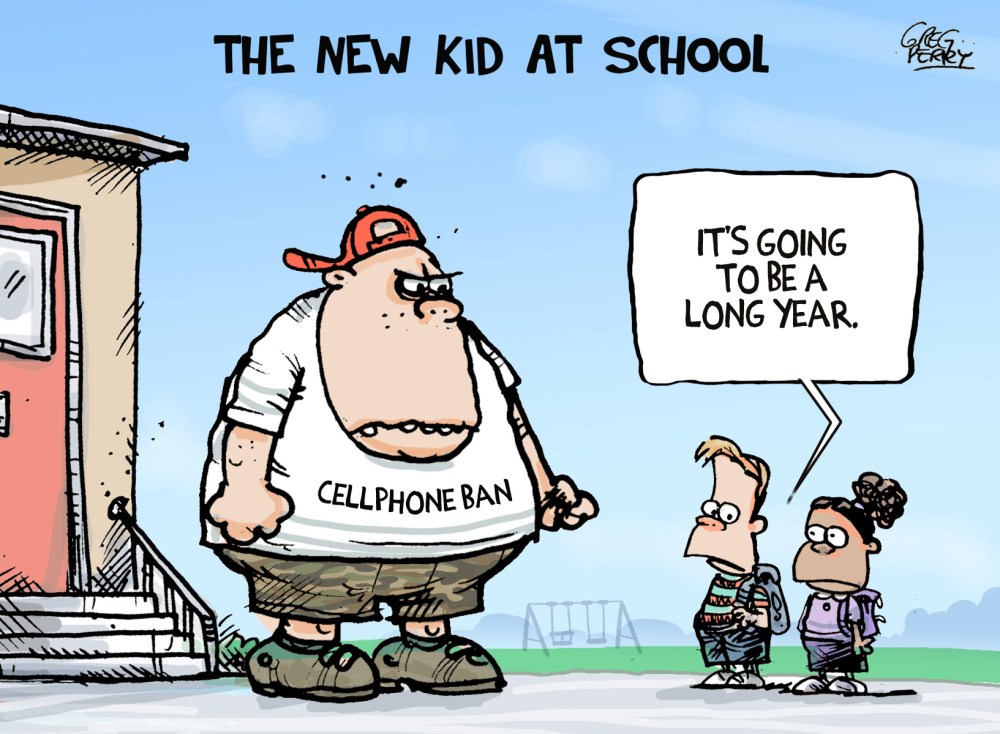Cellphone bans miss the point
Advertisement
Read this article for free:
or
Already have an account? Log in here »
To continue reading, please subscribe:
Monthly Digital Subscription
$1 per week for 24 weeks*
- Enjoy unlimited reading on winnipegfreepress.com
- Read the E-Edition, our digital replica newspaper
- Access News Break, our award-winning app
- Play interactive puzzles
*Billed as $4.00 plus GST every four weeks. After 24 weeks, price increases to the regular rate of $19.95 plus GST every four weeks. Offer available to new and qualified returning subscribers only. Cancel any time.
Monthly Digital Subscription
$4.99/week*
- Enjoy unlimited reading on winnipegfreepress.com
- Read the E-Edition, our digital replica newspaper
- Access News Break, our award-winning app
- Play interactive puzzles
*Billed as $19.95 plus GST every four weeks. Cancel any time.
To continue reading, please subscribe:
Add Free Press access to your Brandon Sun subscription for only an additional
$1 for the first 4 weeks*
*Your next subscription payment will increase by $1.00 and you will be charged $16.99 plus GST for four weeks. After four weeks, your payment will increase to $23.99 plus GST every four weeks.
Read unlimited articles for free today:
or
Already have an account? Log in here »
Hey there, time traveller!
This article was published 23/08/2024 (556 days ago), so information in it may no longer be current.
Last week, the province announced a ban on cellphones in Manitoba classrooms.
We understand the impulse. Cellphone use has been linked to addiction, depression, anxiety, cyberbullying, increased isolation, and decreased physical activity. There is no doubt that young people need clear boundaries when it comes to technology.
However, the rapidly changing technological and media landscape also requires an educational response. A ban on cellphones might provide an easy solution to some problems cellphones pose in schools.

However, it does little to teach the media and digital literacy skills that students need to be healthy users of technology and responsible digital citizens.
With handheld devices that allow users to network, game, and search the internet, youth have unprecedented access to boundless content.
This has resulted in an era of mis/disinformation, incessant consumer messaging, divisive hate speech, and racist propaganda.
Each of these elements require specific literacies. Although youth increasingly live their lives online, they are not automatically digitally literate. Technological acuity is not digital literacy. Schools need to dedicate increased time to teaching media and digital literacies.
This requires that students engage with the platforms and technology that they use to obtain information. The capacity to access and evaluate information is a crucial element of a healthy democracy.
To ensure the prioritization of digital citizenship and digital literacies, action is needed. Students need lessons about how to use technology in a respectful, responsible, and healthy way.
Current curriculum documents and directives offer limited guidance in this area.
More teacher professional development is also required, so that online media literacy and responsible use of technology become a prime part of every classroom and subject area.
As well, to teach these vital lessons, more investment is necessary to improve access to technology within the classroom, particularly for schools that previously relied on students to bring their own devices.
The role of youth as digital citizens is a topic that students need to explore in schools. This requires increased education surrounding privacy, dataveillance, technoethics, and consent.
We live in a time when convenience is held in higher regard than privacy.
Even when people are warned about the personal details that they are willingly or inadvertently sharing with private corporations, there is often little concern. Free apps are seen as a bonus, even when people are informed that they are the real product.
Few people are concerned when online platforms tailor their experience to their previous use, or interests; instead, they may perceive this favourably. However, we know these algorithms can have negative consequences, such as relentless consumer targeting, the rise of online public shaming, or the dangers of democratic interference.
It is our ethical obligation as educators to centre these complex discussions about the intersection of society and technology.
New policies in school divisions are needed to address some of these ethical and security questions. Technology purchased by governments and school divisions through the pandemic placed student safety and privacy at risk.
A report prepared for Human Rights Watch revealed that school-endorsed technology tracked and surveilled students throughout the day, followed them beyond their online classroom to other apps and platforms, and shared their information with advertising companies.
They also noted students’ physical locations, accessed their contact lists, and downloaded details about students’ friends and families. A school ban on cellphones does not make students safe from these corporate tactics.
School divisions should concentrate on creating policies that ensure that all the technology purchased and used in schools prioritizes student safety and privacy over corporate profit. Moreover, governments should consider pursuing regulations on technology companies to better protect young people. Technology companies are trampling on children’s rights, but children are being regulated rather than companies.
Bans are a simple solution to a complex problem. Protecting students and helping them learn about responsible use of technology requires more than a simple ban. We need to examine our current practices with technology in education and center teaching that responds to the way students obtain information and interact with online spaces.
In this case, a ban alone does not solve the problem, and more action is desperately needed.
Shannon D.M. Moore is an assistant professor at the faculty of education, University of Manitoba. Ellen Bees is a middle school teacher in Winnipeg.







